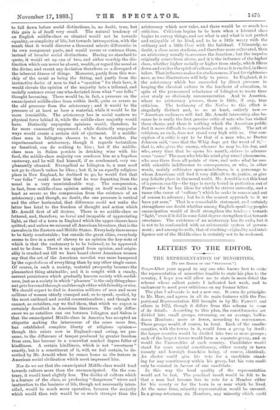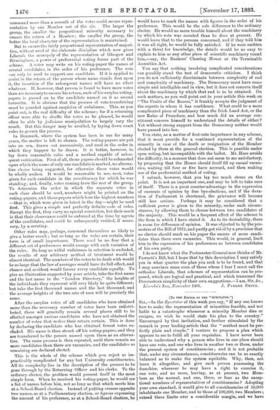LETTERS TO THE EDITOR.
THE REPRESENTATION OF MINORITIES.
[To THE EDITOR Or THE "SPECTATOR.")
Sia,—After your appeal to any one who knows bow to make the representation of minorities feasible to state his plan to the country, I hope you will allow me to state in more detail the scheme whose salient points I indicated last week, and to endeavour to meet your criticisms on my former letter.
The plan I advocate is not a new one. It owes its principles to Mr. Hare, and agrees in all its main features with the Pro- portional Representation Bill brought in by Mr. Fawcett and others in 1872, though it differs from this scheme in some of its details. According to this plan, the constituencies are divided into small groups, returning, on an average, half-a- dozen Members ; more or fewer, according to convenience. These groups would, of course, be local. Each of the smaller counties, with the towns in it, would form a group by itself ; the larger counties would be divided into two or more groups ; each of the largest towns would form a separate group, and so would the Universities of each country. Candidates would stand for some special constituency, either county or town (county and borough franchise being, of coarse, identical). An elector could give his vote for a, candidate stand- ing for any constituency within his group, but his vote could only be counted in favour of one candidate.
In this way the local quality of the representation would not be lost. The practical result would be felt to be that a man had become free to vote for a Member either for his county or for the town in or near which he lived. At the same time, minority representation would be ensured. In a group returning six Members, any minority which could command more than a seventh of the votes could secure repre- sentation by one Member out of the six. The larger the group, the smaller the proportional minority necessary to ensure the return of a Member ; the smaller the group, the better the local character of the representation is maintained.
But to ensure the fairly proportional representation of majori- ties, without need of the elaborate discipline which now gives Liberals the monopoly of the representation of Glasgow and Birmingham, a power of preferential voting forms part of the scheme. A voter may write on his voting-paper the names of several candidates, in the order of his preference. The vote can only be used to support one candidate. If it is applied to assist in the return of the person whose name stands first upon it, the insertion of the subsequent names will have no effect whatever. If, however, that person is found to have more votes than are necessary to ensure his return, each of his surplus voting- papers is passed on to the candidate named on it as second favourite. It is obvious that the process of vote-transferring must be guarded against suspicion of unfairness. This, as you point out, is the real difficulty of the scheme ; for if a returning officer were able to shuffle the votes as he pleased, he would often be able by judicious manipulation to largely vary the result. But this danger may be avoided, by laying down exact rules to govern the process.
In Denmark, where the system has been in use for many years, the matter is left to chance. The voting-papers are put into an urn, drawn out successively, and used in the order in which they happen to be drawn. It is better, however, to lay down reasonable rules and a method capable of subse- quent verification. First of all, those papers should he exhausted upon which the name of only one candidate is marked, no alterna- tive choice being suggested, for otherwise these votes would be wholly useless. It would be reasonable to use, next, votes given for each candidate in the constituency for which lie was standing; and, finally, votes coming from the rest of the group. To determine the order in which the separate votes in each class should be used, numbers might be printed on the. voting-papers, and those papers which bore the highest numbers —that is, which were given in latest in the day—might be used first. This gives a simple and perfectly definite code of rules. Except the first, they carry no special conviction, but their merit is that their observance could be enforced at the time by agents of the candidates, and could be subsequently verified, if neces- sary, by a scrutiny.
Other rules may, perhaps, commend themselves as likely to give a better result ; but so long as the rules are certain, their form is of small importance. There need be no fear that a different set of preferences would emerge with each variation of the rules. So long as wilful unfairness in selection is excluded, the results of any arbitrary method of treatment would be almost identical. The numbers of the votes to be dealt with would be so large that the law of averages would have its full effect, and chance and accident would favour every candidate equally. To give an illustration suggested by your article, take the first name and the last name in the "London Directory," the heights of the individuals they represent will very likely be quite different; but take the first thousand names and the last thousand, and the average heights of the two sets of men will be precisely the
same.
After the surplus votes of all candidates who have obtained more than the necessary number of votes have been redistri- buted, there will generally remain several places still to be allotted amongst various candidates who have not obtained the number of votes that makes their return certain. This is done by declaring the candidate who has obtained fewest votes ex- cluded. His name is then struck off his voting-papers, and they are transferred to the person named upon them as an alterna- tive. The same process is then repeated, until there remain no more candidates than there are vacancies, and the candidates so remaining are declared elected.
This is the whole of the scheme which you reject as im- practicably complicated for any but University constituencies. All its complexity lies in the description of the process to be gone through by the Returning Officer and his clerks. To the ordinary elector, the problem would present itself in the most simple form. When he received his voting-paper, he would see a list of names before him, not so long as that which meets him at a School-Board election. Instead of putting crosses opposite two names, as at a Parliamentary election, or figures expressing the amount of his preference, as at a School-Board election, he
would have to mark the names with figures in the order of his preference. This would be the sole difference to the ordinary elector. He would no more trouble himself about the machinery by which his vote was counted than he does at present. He would leave that to the persons concerned, and if they told him it was all right, he would be fully satisfied. If he were smitten with a thirst for knowledge, the details would be as easy to explain to him as any other piece of scientific machinery round him,—say, the Bankers' Clearing House or. the Terminable Annuities Act.
You say that nothing involving complicated considerations can possibly stand the test of democratic criticism. I think you do not sufficiently discriminate between complexity of end and complexity of machinery. The Democracy must have some simple and intelligible end in view, but it does not concern itself about the machinery by which that end is to be attained. On such matters, as you well point out in your article this week on " The Fruits of the Recess," it frankly accepts the judgment of the experts in whom it has confidence. What could be a more complicated piece of machinery than the Irish Land Act, or the new Rules of Procedure, and how much did an average con- stituent concern himself to understand the details of either P Yet without strong support from the Democracy neither would have passed into law.
You state, as a matter of first-rate importance in any scheme, that it must provide for a continued representation of the minority in case of the death or resignation of the Member elected by them at the general election. This is possible under open voting, but incompatible with the ballot. Mr. Hare avoids the difficulty, in a manner that does not seem to me satisfactory, by proposing that the House should itself fill up casual vacan- cies, waiting till four or five have accrued, and then making use of the preferential method of voting.
I submit, however, that you lay too much stress on the point. It is not an important one, and may be left to take care of itself. There is a great counter-advantage in the expression of currents of opinion by free bye-elections, and if the dura- tion of Parliament is shortened, the grievance will become still less serious. Perhaps it may be considered that a sufficient power is given to the minority, under such circum- stances, by allowing them to choose between two candidates of the majority. This would be a frequent effect of the scheme in the form in which I have stated it. As to its desirability, there is room for difference of opinion. It was objected to by the pro- moters of the Bill of 1872, and partly got rid of by a provision that no elector should mark on his paper the names of more candi- dates than there were vacancies. This would, in general, limit him to the expression of his preferences as between candidates of his own party.
I do not know what the Postmaster-General now thinks of Mr. Fawcett's Bill, but I hope that by this description I may satisfy you in what quarter the plan you seek is to be found, and that I may convince some even of those whom I fear I must call the orthodox Liberals, that schemes of representation can be pro- posed, which are logical and practical, and which transcend the Procrustean simplicity of their own.suggestions.—I am, Sir, &c., Lincoln's Inn, November 14th. J. PARKER SMITH.



































 Previous page
Previous page